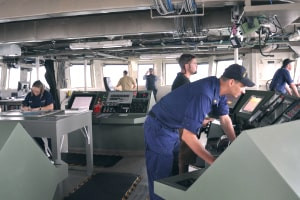Marine Refrigeration and Climate Control is a free online course that begins by introducing you to the concept of ventilation and types of ventilation used on cargo ships, as well as to the different types of ‘sweat’ that occur. Engine room ventilation arrangement, as well as the importance of the engine room ventilation systems, will be covered in this course. You will learn about the difference between fans, blowers and compressors, as well as the factors to consider when selecting a fan and fan maintenance. The material will teach you about the maintenance and monitoring of shipboard ventilation components, as well as the working principles of a vapour-compression refrigerant cycle. The relationship between the refrigerant cycle and coefficient of performance, as well as the vapour compression cycle, will also be covered. You will be introduced to the brine and direct expansion system, as well as the main components of a direct expansion refrigeration system. You will also learn about the operations of a refrigeration system, as well as safety devices needed to protect compressors.
The course then explains the concept and functions of the ‘cascade system’, as well as the concepts of ‘coupling temperature’ and ‘optimum coupling temperature’. You will learn about the functions of the multiple compression and evaporator system. The features, functions, components, as well as advantages of the indirect expansion system, will also be covered. You will be taught about the preparations of holds for loading refrigerated cargo, precautions for loading, handling refrigerated cargo,
What You Will Learn In This Free Course
View All Learning Outcomes View Less All Alison courses are free to enrol, study, and complete. To successfully complete this Diploma course and become an Alison Graduate, you need to achieve 80% or higher in each course assessment.
Once you have completed this Diploma course, you have the option to acquire an official Diploma, which is a great way to share your achievement with the world.
Your Alison certificate is:
- Ideal for sharing with potential employers.
- Great for your CV, professional social media profiles, and job applications.
- An indication of your commitment to continuously learn, upskill, and achieve high results.
- An incentive for you to continue empowering yourself through lifelong learning.
Alison offers 2 types of Diploma for completed Diploma courses:
- Digital Diploma: a downloadable Diploma in PDF format immediately available to you when you complete your purchase.
- Physical Diploma: a physical version of your officially branded and security-marked Diploma
All Diplomas are available to purchase through the Alison Shop. For more information on purchasing Alison Diploma, please visit our FAQs. If you decide not to purchase your Alison Diploma, you can still demonstrate your achievement by sharing your Learner Record or Learner Achievement Verification, both of which are accessible from your Account Settings.












 Avg. Hours
Avg. Hours  Contains Video
Contains Video  CPD Accredited
CPD Accredited 
 Total XP:
Total XP: 
 Knowledge & Skills You Will Learn
Knowledge & Skills You Will Learn 






